|
|
|
Sort Order |
|
|
|
Items / Page
|
|
|
|
|
|
|
| Srl | Item |
| 1 |
ID:
144167
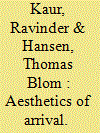

|
|
|
|
|
| Summary/Abstract |
India’s celebrated ‘arrival on the global stage’ as a desirable ‘emerging market’ for global investors signals the spectacular moment that is said to have ruptured the barriers between the first and third worlds. If the notion of arrival anticipates the long-awaited acceleration in the pace of history, it also harnesses a euphoric India to the limitless future promised by the new. In this special issue, we set our focus on the aesthetics of arrival that signal novelty, visibility and celebration of post-reform India within and outside the nation. We ask how novelty is manufactured and experienced when the majority of the population remains excluded from new India. The answer probably lies in the way in which this other India is signified as the past, as ‘old India’ that holds back the nation. The novelty, we propose, is not only experienced in the promise of the future, but also in the aesthetic force of the promise to overcome a humiliating past, tainted by colonialism, in order to realise a truer and more timeless ‘new’ India
|
|
|
|
|
|
|
|
|
|
|
|
|
|
|
|
| 2 |
ID:
113092
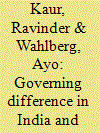

|
|
|
| 3 |
ID:
147880
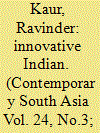

|
|
|
|
|
| Summary/Abstract |
The idea of jugaad, or frugal innovation, has gained wide popularity within policy circles and business schools as a breakthrough formula – from a quick-fix solution grown in adverse conditions to a six-point business principle – for economic growth generation. I argue that the new jugaad innovation narrative offers an uplifting, potentially emancipatory discourse of mobility in a setting where even after two decades of economic reforms, wealth gap and poverty stubbornly persist. Central to this shift are two processes. First, a dramatic re-signification of the aam aadmi (common man), within a new conceptual scaffolding of India in relation to modern science and technology, where the ability to innovate is portrayed as a natural gift, a deeply ingrained collective Indian trait that even the unlettered common man possesses. Second, the conditions of adversity and absence of public services for Indian citizens are turned on its head to position India as an ideal laboratory condition within which a culture of innovation takes birth. In short, jugaad enables a dramatic transformation of what was once considered unchanging, static and immobile mass into a source of innovation, inspiration and ultimately socioeconomic mobility.
|
|
|
|
|
|
|
|
|
|
|
|
|
|
|
|
| 4 |
ID:
113094


|
|
|
|
|
| Publication |
2012.
|
| Summary/Abstract |
The idea of a post-1990s re-formed India is shaped by an imaginary of a fractured body of the nation-a 'new' nation in tune with the neoliberal desires of a structurally adjusted world and the 'old' nation constitutive of superfluous matter in excess of that seductive world. This imaginary is not only etched in popular discourses but also in the policy-making apparatus engaged in the task of creating a global identity for India. Taking the Brand India initiative-promoted by the Indian state to produce positive images of the nation for global publicity-as a case study, this article argues that in this shift from nation building to nation branding, the very idea of prosperity and equity has now become first and foremost a matter of image. In this world of images, one can also witness how a competitive strategy to seek more corporate investments through concerted brand campaigns has redefined the relationship between the nation and corporations. While earlier it was the corporations which sought the endorsement and patronage of the sovereign, now it is sovereign nations which are seeking to become the most 'favoured investment destinations' that purvey global capital.
|
|
|
|
|
|
|
|
|
|
|
|
|
|
|
|
| 5 |
ID:
144170
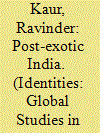

|
|
|
|
|
| Summary/Abstract |
This paper examines the aesthetics of remixing history at the heart of the neoliberal project of India’s image makeover as the ‘land of limitless opportunity’ for global tourists and investors. I argue that the project of remixing India’s history is predicated upon the ontological fault line of how to retain and erase the original simultaneously while shaping the new in the contemporary global. Taking the Incredible India campaign as an example, I show how the original essence of India is revealed and authenticated in the very moment of its disappearance as it is morphed in the aesthetics of the contemporary global. The post-exotic self, I further argue, is not produced by effacing the exotic past, but by condensing, accelerating and fast-forwarding it into a timeless, infinite global present. And in doing so, it also reveals the blueprint of the ongoing visual rearrangement of nation’s civilisational past in the making of new India.
|
|
|
|
|
|
|
|
|
|
|
|
|
|
|
|
| 6 |
ID:
065931


|
|
|
|
|
| Publication |
New Delhi, Sage Publications, 2005.
|
| Description |
228p.
|
| Standard Number |
0761934308
|
|
|
|
|
|
|
|
|
|
|
|
Copies: C:1/I:0,R:0,Q:0
Circulation
| Accession# | Call# | Current Location | Status | Policy | Location |
| 050186 | 303.60954/KAU 050186 | Main | On Shelf | General | |
|
|
|
|
| 7 |
ID:
078333
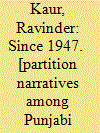

|
|
|
|
|
| Edition |
1st ed.
|
| Publication |
Oxford, Oxford University Press, 2007.
|
| Description |
vii, 277p.: tableshbk
|
| Standard Number |
0195683773
|
|
|
|
|
|
|
|
|
|
|
|
Copies: C:1/I:0,R:0,Q:0
Circulation
| Accession# | Call# | Current Location | Status | Policy | Location |
| 052517 | 954.04/KAU 052517 | Main | On Shelf | General | |
|
|
|
|
| 8 |
ID:
147874
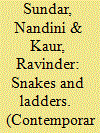

|
|
|
|
|
| Summary/Abstract |
The question of social mobility in a terrain of increasing inequality has gained particular urgency in post-reform India. We approach social mobility not as a one-way ascent toward the top, rather as a risk-laden enterprise prone to fluctuations that include both incremental gains and the possibility of sliding downwards. We argue that to ‘move up the ladder’ is not merely a matter of individual choice or hard work in the face of odds as free-market believers have long held. It is as much an outcome of collective political bargaining, privileges that dominant class and caste status affords, access to resources and, indeed, occasional luck. Two propositions follow. First, we suggest that the state remains albeit as a reluctant enabler of social mobility in the age of markets. Second, the participation in the new economy hinges also upon one’s ability to ‘dress up’ for the part, to be able to craft one’s look as if one belonged to spaces – work or leisure – that one desires to inhabit. The work of appearances, we suggest, does not operate at individual levels alone, it also encompasses the nation’s spectacular projection of itself in the global political economy.
|
|
|
|
|
|
|
|
|
|
|
|
|
|
|
|
|
|
|
|
|